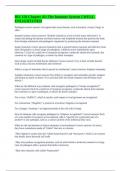Exam (elaborations)
BIL 150 Chapter 43: The Immune System || WELL-ENLIGHTENED
- Course
- Institution
Pathogens correct answers Are agents that cause disease, such as bacteria, viruses, fungi, or other Immune system correct answers *Enables animals to avoid or limit many infections*; A system (including the thymus and bone marrow and lymphoid tissues) that protects the body from foreign substanc...
[Show more]



